Key takeaways:
- Meal prepping transforms chaotic weeknight dinners into organized and healthy choices by setting aside dedicated time for preparation.
- Investing in quality tools and planning meals around personal preferences enhance the meal prep experience and make it enjoyable.
- Storing meals properly and embracing batch cooking lead to greater freshness, convenience, and a satisfying cooking routine.
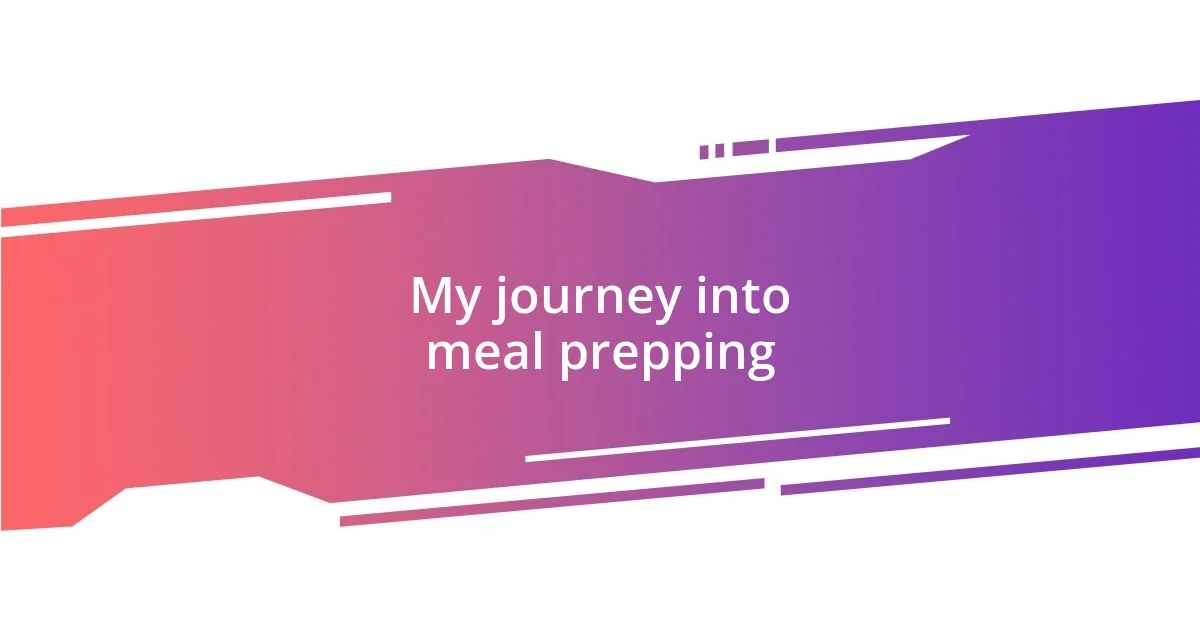
My journey into meal prepping
My journey into meal prepping began a few years ago when I realized I was often scrambling for dinner at the end of a long day. I remember standing in front of the fridge, feeling overwhelmed by the options but having no idea what to make, which led to unhealthy choices. Have you ever felt that frustration? It was a game-changer for me when I decided to set aside a few hours each weekend to plan and prepare my meals.
Each session has turned into a small ritual that I genuinely enjoy. I choose my favorite recipes, blast some music, and immerse myself in the process. There’s something satisfying about chopping vegetables, measuring out grains, and knowing that I’m taking proactive steps for my health. I can vividly recall the first time I opened my refrigerator after prepping—I felt a sense of pride and control that I hadn’t experienced before.
Over time, I’ve leaned into the creative side of meal prepping, experimenting with different ingredients and flavors. I often think about how meal prepping transformed my week from chaotic to organized. By focusing on my health this way, I’ve not just saved time; I’ve also discovered a deeper appreciation for the food I consume. What lessons have you taken from your own food journey?
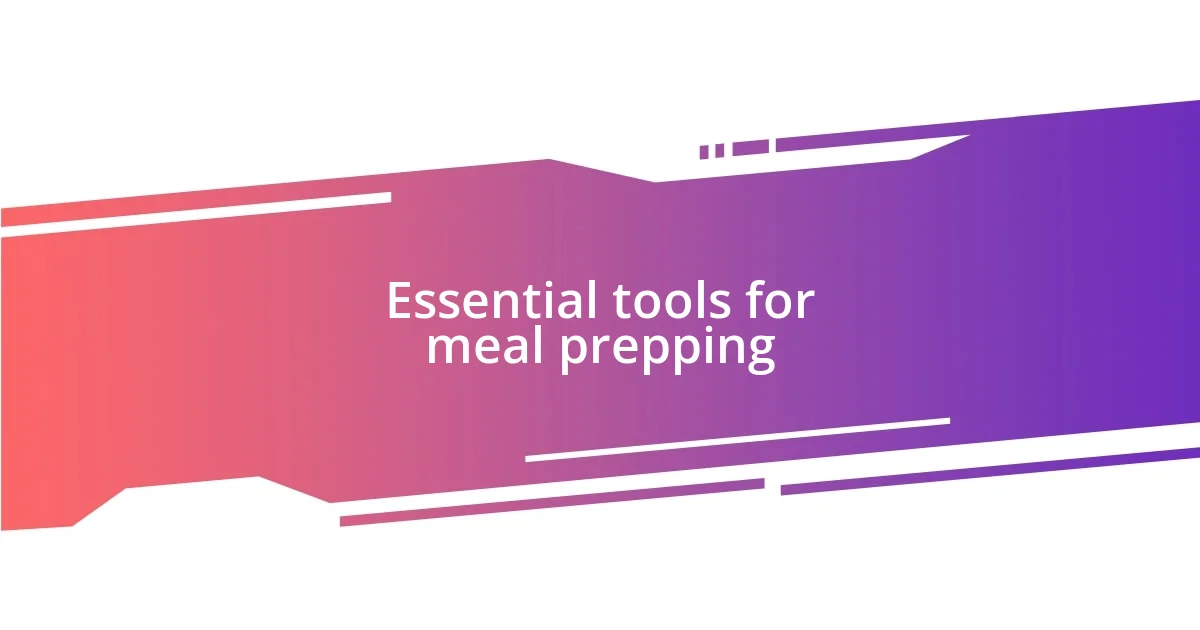
Essential tools for meal prepping
When I first started meal prepping, I quickly realized that having the right tools made all the difference. I fondly remember my initial struggle with a flimsy cutting board that wobbled every time I sliced vegetables. It was frustrating, to say the least! Investing in quality tools not only made the process smoother but also turned it into an enjoyable experience. Here’s a list of essential tools that I believe every meal prepper should consider:
- Cutting board: A sturdy, large cutting board to handle all your chopping needs.
- Sharp knife: A good chef’s knife to make slicing and dicing effortless.
- Meal prep containers: Portioned, airtight containers to store your meals and snacks securely.
- Measuring cups and spoons: To ensure you’re using the right amounts, especially when baking.
- Slow cooker or Instant Pot: For those lazy days when you want to set it and forget it.
- Blender: Great for smoothies, soups, and sauces that can be prepared ahead of time.
Having these tools at your disposal has transformed my meal prepping routine. I still remember the first time I used a set of glass containers—everything looked so organized and fresh in my fridge! It really felt like I was getting a handle on my health, and oddly enough, I found myself enjoying the sight of prepped meals as much as the meals themselves. The joy of pulling out a homemade dish, knowing I’d created it with my own hands, is something I cherish. Each tool plays a role, turning what once felt like a chore into an empowering ritual that fuels my week.
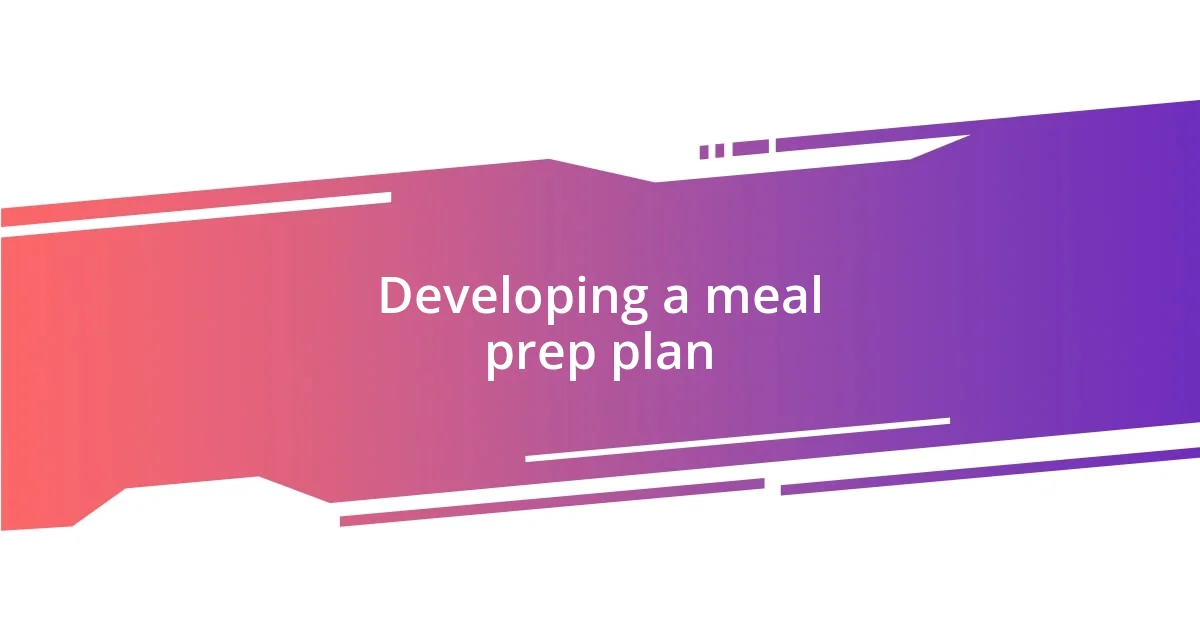
Developing a meal prep plan
When developing a meal prep plan, the first step is identifying your goals and dietary preferences. I found it incredibly helpful to jot down what meals and snacks I genuinely enjoy, which has made planning much more enjoyable. For instance, I love hearty salads and grain bowls, so my week often revolves around those. It’s essential to think about what ingredients you want to incorporate, as they can make or break your meal prep experience. Have you ever realized that sticking to what you love keeps you motivated? I certainly have!
The next phase involves strategizing how to allocate your time effectively. Personally, I like to dedicate Sunday afternoons to this task, treating it as a time to unwind and recharge for the week ahead. I prepare a menu that includes a mix of versatile components, like roasted vegetables, proteins, and grains, that can be combined in various ways throughout the week. This way, I avoid recipe fatigue. The freedom to change up my meals while using similar ingredients has transformed my perspective on cooking, reinforcing how meal prepping can be both flexible and exciting.
| Key Factors | Personal Approach |
|---|---|
| Identify Goals | Focus on meals I love, like hearty salads and grain bowls. |
| Time Allocation | Set aside Sunday afternoons for meal prep, treating it as self-care. |
| Versatile Components | Prepare roasted vegetables, proteins, and grains to mix and match. |
Lastly, don’t underestimate the power of creativity in your meal prep plan. I’ve often experimented with new ingredients or cooking techniques, turning each prep session into a mini culinary adventure. For example, one week, I tried making my own sauces, which not only elevated the dishes but also kept my meals diverse and exciting. It’s moments like these that I cherish—the satisfaction of tasting something I made from scratch. Have you ever stepped out of your comfort zone in the kitchen? It can be incredibly rewarding!
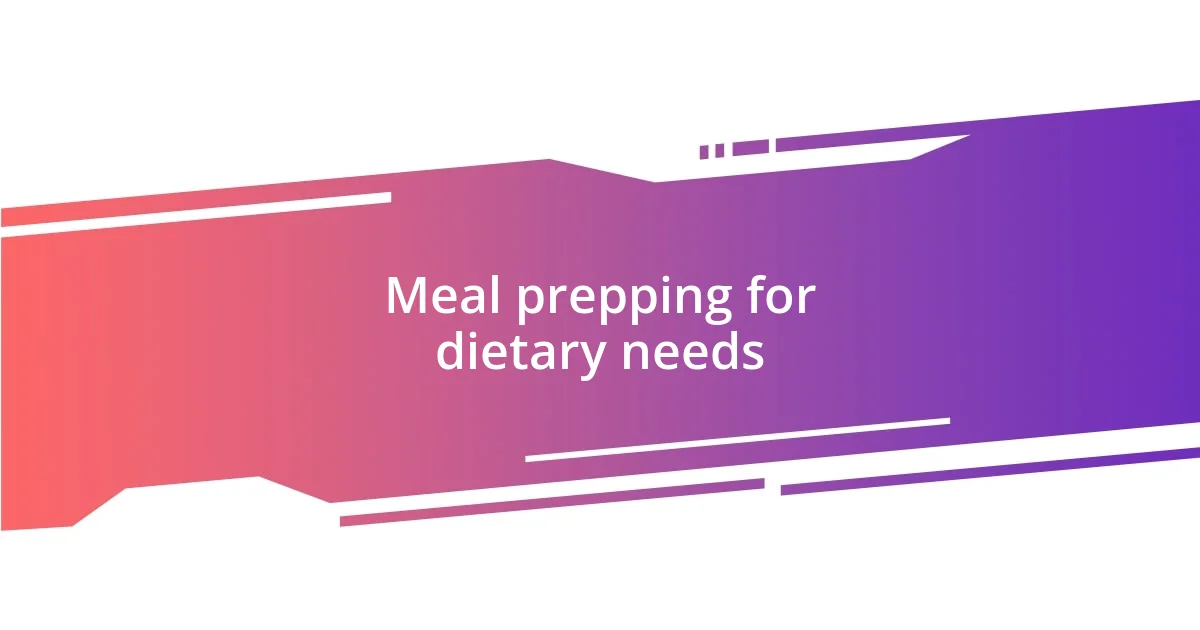
Meal prepping for dietary needs
When it comes to meal prepping for dietary needs, I’ve learned that personalization is key. For instance, I have a friend who’s gluten intolerant, and I remember her struggles before we discovered a variety of gluten-free grains that could easily replace traditional ones. Swapping out quinoa or buckwheat for pasta in dishes not only catered to her dietary needs but also introduced some delicious new flavors that we both ended up loving. It’s fascinating how accommodating meals can lead to exciting culinary discoveries!
Balancing macronutrients is another crucial aspect I can’t overlook. In my own experience, ensuring that every meal I prep contains a good mix of protein, healthy fats, and carbs has helped me feel satisfied and energetic. I recall the week I tried prepping meals around lean proteins like chicken and chickpeas, paired with vibrant vegetables. The result was not only visually appealing but also incredibly nutritious. Do you ever feel fatigued from meals that lack balance? Creating nutritious combinations has truly made a difference for me in how I feel throughout the day.
Lastly, keeping dietary restrictions in mind means always being mindful of cross-contamination, especially for allergies. One time, I overlooked a shared utensil while prepping for a friend with a nut allergy. That taught me the importance of having separate kitchen tools for different dietary needs. I now label my containers and use designated cutting boards. How about you? Have you had similar moments that reshaped how you approach meal prepping? It’s these little insights that not only enhance our cooking experience but also solidify our commitment to health.
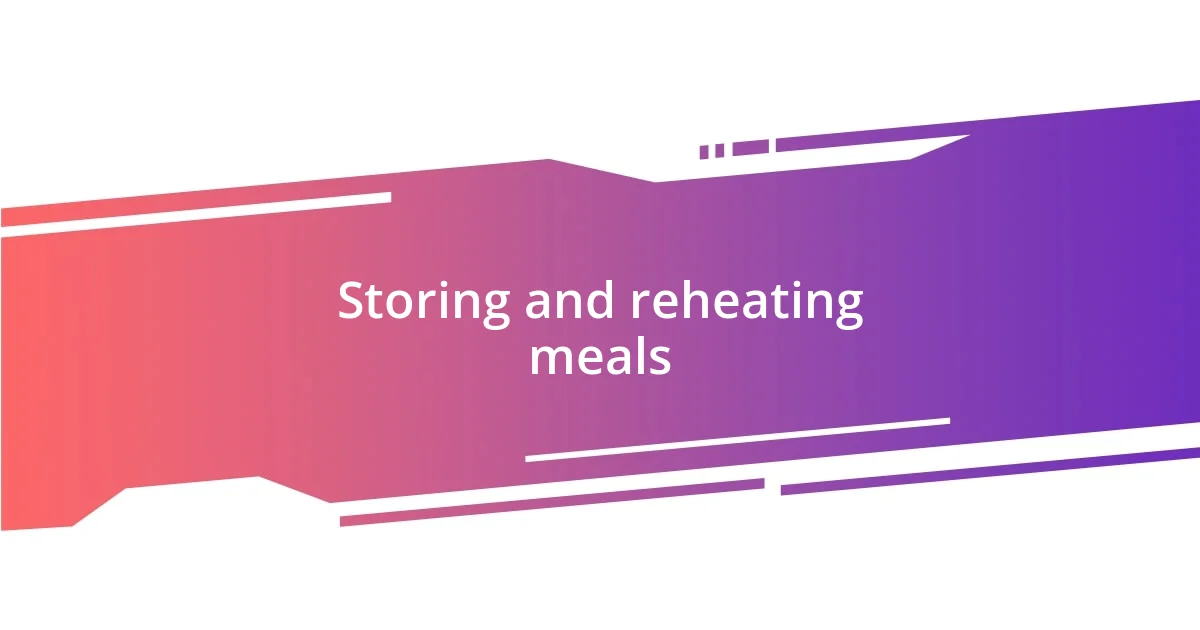
Storing and reheating meals
Storing meals properly is crucial for maintaining their freshness and flavor. I remember the first time I popped my carefully prepped dishes into the refrigerator, only to find them a bit soggy by midweek. It taught me the importance of using airtight containers to create a proper seal. Have you ever opened a container only to be greeted by a less-than-appealing sight? That’s why I also learned to allow certain foods to cool before sealing them—this helps prevent condensation, leading to better meals later on.
When it comes to reheating, I’ve discovered that less is often more. The microwave tends to zap the life out of my favorite dishes, so I’ve switched to using an oven or stovetop for most of my meals. For instance, reheating roasted veggies in the oven for a few minutes brings back their crispiness, making them feel fresh again. It’s amazing how a simple adjustment can elevate a meal. Do you find the reheating process affects your enjoyment of the food? I certainly do!
I’ve also experimented with portioning out my meals for convenience, and it’s been a game changer. Packing single servings not only makes my week easier but also helps me control my portion sizes. I remember feeling proud of myself when, one busy Friday, I grabbed a pre-portioned container from the freezer. That moment of ease made me realize that thoughtful storage can transform the way we experience food. What about you—have you ever thought about how your storage habits can impact your meal enjoyment? It’s these small changes that lead to significant differences in our meal prep journeys.

Tips for meal prep success
One invaluable tip for meal prep success is to plan your menu before diving into the kitchen. I’ve found that taking a little time to map out what I want to eat for the week prevents me from feeling overwhelmed when it’s time to cook. Do you ever stand in front of the fridge, unsure of what to create? I used to, and I realized that a simple meal plan cuts down on that last-minute chaos and keeps my meals diverse and exciting.
Shopping smart is another game changer. I recall a shopping trip where I ended up with way too many ingredients I didn’t even use. Now, I swear by sticking to my grocery list based on my meal plan, which not only helps me stay organized but also minimizes waste. Have you ever bought veggies that wilted before you had a chance to cook them? Knowing exactly what you need can save you both money and time, creating a much smoother prepping process.
Lastly, embracing batch cooking has substantially improved my meal prep routine. Instead of whipping up individual meals every night, I now dedicate a couple of hours on Sunday to cook larger portions. I remember the first time I made a huge pot of lentil soup; I froze individual servings, making weeknight dinners a breeze. Isn’t it liberating to know that a hearty, nutritious meal is just minutes away? It’s these little efficiencies that not only simplify life but also make you feel accomplished as you nourish yourself.















